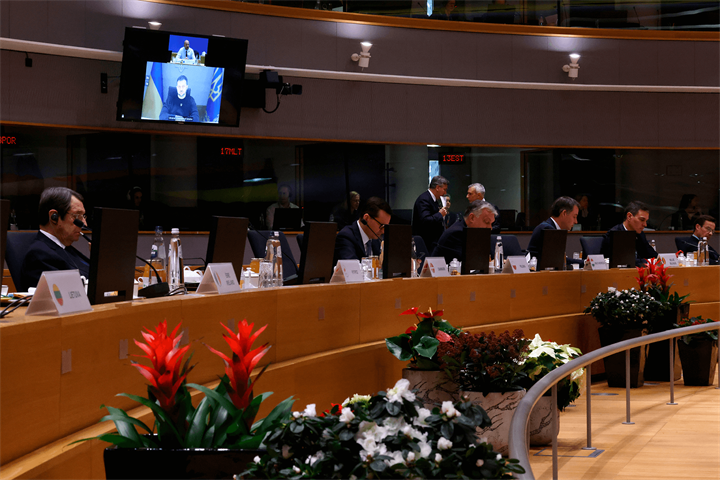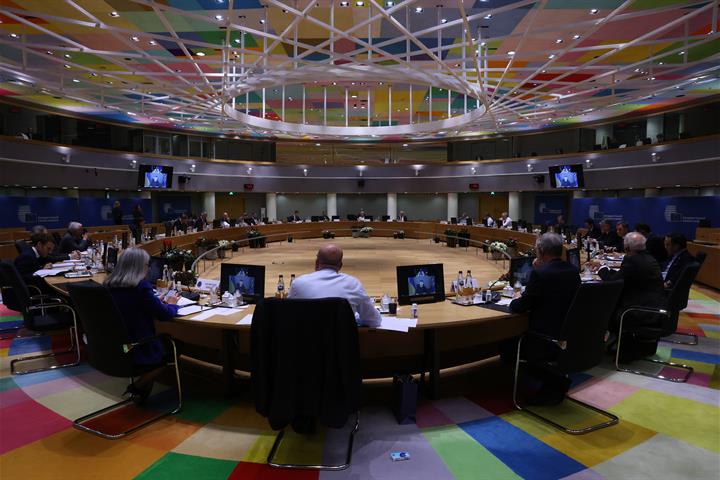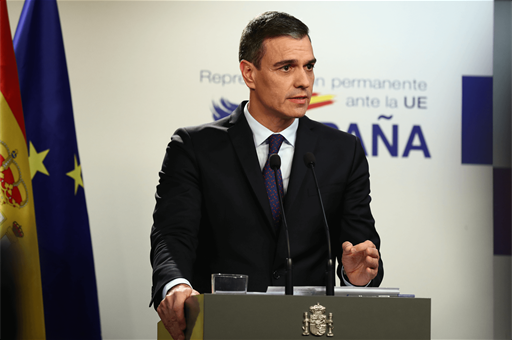Sánchez highlights the mandate of the EU-27 for energy ministers to reach an agreement on the gas price ceiling
President's News - 2022.12.15
Brussels (Belgium)
The President of the Government of Spain has taken part in the European Council held in Brussels, which has dealt with issues such as the Russian invasion of Ukraine, the economic situation and the energy crisis, transatlantic relations and the Southern Neighbourhood, among others.
Sánchez congratulated the Czech Presidency of the Council of the EU, which will come to an end in the next few days, saluting the "extraordinary work" it has done "in difficult circumstances", in reference to the Russian aggression against Ukraine and its consequences. He also highlighted the 1st EU-ASEAN Summit, which he attended in Brussels and which has served to "strengthen relations with the Association of Southeast Asian Nations, an area of huge importance for Europe" to move towards an open strategic autonomy.
With regard to the European Council, Pedro Sánchez first referred to the intervention of the President of the European Parliament, Roberta Metsola, who provided member states with relevant information on the investigation into corruption cases involving several MEPs, including a vice-president. Sánchez has applauded the firmness with which the institution has acted in response to events, putting in place measures to prevent and tackle corruption in the European Parliament, and has stated that new measures will be taken in this direction in the near future.
Unity vis-à-vis Russia's invasion of Ukraine
The President underlined the unanimous condemnation by the EU-27 of the massive bombing that Russia is carrying out against civilian infrastructure in Ukraine. "We reaffirm our unreserved support for Ukraine in all areas: political, economic, humanitarian and military," he said. He also highlighted the approval, during this European Council, of a ninth package of sanctions against Russia, a decision that "hits Putin's regime even harder, while at the same time tries to preserve global food security, a concern shared by many member states", he explained.
 The President of the Government of Spain, Pedro Sánchez, with the rest of the leaders of the European Union, during the working session of the European Council | Pool Moncloa/Fernando Calvo y Pool UE
The President of the Government of Spain, Pedro Sánchez, with the rest of the leaders of the European Union, during the working session of the European Council | Pool Moncloa/Fernando Calvo y Pool UE
This ninth package of sanctions comes on top of other recently adopted measures, such as the oil price cap that Spain agreed with other international partners in early December. For the President of the Government, this consensus on the adoption of measures is "a sign of the unity that has not wavered since the beginning of the war".
Also with regard to Ukraine, Pedro Sánchez announced that European leaders agreed on Thursday on a major macro-financial assistance package amounting to €18 billion.
Energy and Economy
In the field of energy, the President of the Government recalled the October European Council, stating that "we already gave a mandate to the Commission and the Council to set up a dynamic price corridor to immediately limit episodes of excessive natural gas prices". Almost two months later and in the absence of final results following Tuesday's Extraordinary Energy Council, European leaders today gave clear guidance on the key elements of the package, including the concept of "excessive pricing". The aim of this mandate is for energy ministers to be able to reach a final agreement on Monday 19.
With regard to the current economic situation, the President of the Government indicated that there was consensus on the need to continue working to guarantee Europe's industrial competitiveness and reduce strategic dependencies. Pedro Sánchez referred to the letter sent by the President of the European Commission, Ursula von der Leyen, to European leaders on Tuesday. "In line with the letter, leaders have asked the commission to present in the first months of 2023 a plan to improve the global competitiveness of our industry, attract greater investment in strategic sectors and respond in an appropriate manner to the US Inflation Reduction Act", explained the President of the Government.
Sánchez also defended the need to improve the state aid framework, "to make it more flexible and less bureaucratic". In this respect, he also explained that he is actively in favour of the creation of a community instrument to support the industrial fabric of our country, which is currently "suffering dramatically from the increase in energy prices".
Transatlantic relations and the Southern Neighbourhood
 The President of the Government of Spain, Pedro Sánchez, with the rest of the leaders of the European Union, during the working session of the European Council | Pool Moncloa/Fernando Calvo y Pool UE
The President of the Government of Spain, Pedro Sánchez, with the rest of the leaders of the European Union, during the working session of the European Council | Pool Moncloa/Fernando Calvo y Pool UE
The 27 have held a strategic debate on transatlantic relations from a variety of perspectives. More specifically, the President referred to the Inflation Reduction Act in the US, stating that it could affect the "level playing field" in trade and industry at the global level. "Spain advocates an ambitious negotiation with the Biden administration that exempts European companies from the worst consequences of this law," Sánchez said.
In terms of the debate on the Southern Neighbourhood, the President of the Government said that Spain is adamant about the need to strengthen relations "with a region of vital importance for Europe", stressing that the government intends to give definitive impetus to this relationship during the Spanish Presidency of the Council in the second half of 2023. "We share many interests and challenges with this region," he concluded.
Pedro Sánchez also welcomed the decision to grant Bosnia and Herzegovina candidate status for EU membership. "Last June I spoke out clearly in favour of taking this decision, which sends a message of support and confidence to our partners in the Western Balkans that is even more essential at this time," he said.
Last, in the context of the ongoing protests in Iran, European leaders have been unanimous in condemning the unacceptable executions being carried out by the Iranian government.
Non official translation





